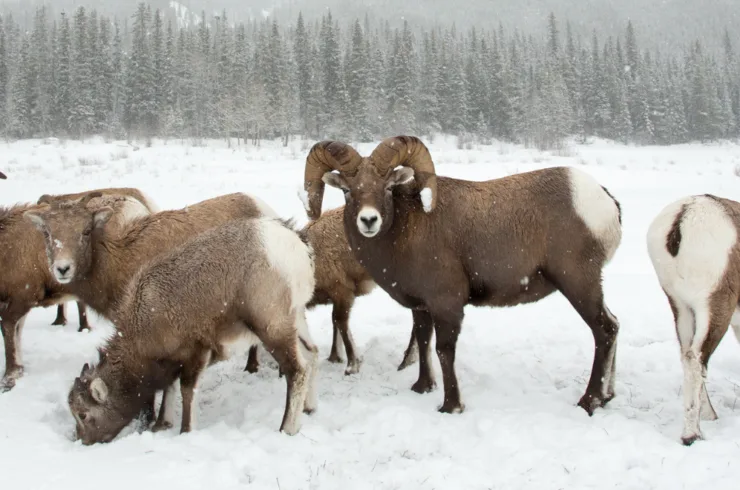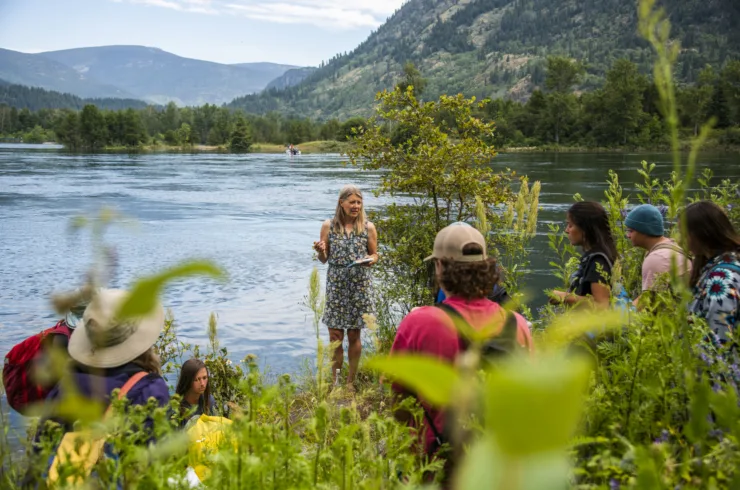Wildsight is applauding BC Timber Sales for its commitment to pause all new development in core habitat, these areas are critical to the ongoing survival of endangered deep-snow caribou in the Revelstoke-Shuswap region.
The decision, which was communicated to Wildsight via email, will help safeguard the future of the Columbia North caribou herd, one of the last remaining southernmost herds in British Columbia.
“BC Timber Sales controls important caribou habitat within their tenures in the Revelstoke-Shuswap,” said Wildsight Conservation Specialist Eddie Petryshen. “This is a significant move and it sets a precedent for other licensees to stop logging core habitat in the Revelstoke-Shuswap.”
Logging poses one of the biggest threats to the future of the Columbia North herd, which has only a third of its core habitat protected despite the federal recovery strategy determining that 100% should be protected.

New commitment excludes ‘existing investments’, threatens Nagle Creek habitat
In its email to Wildsight, BC Timber Sales, the provincial government’s own timber agency, said: “Within unprotected Core, we are only pursuing blocks that have had existing investments that were nearing completion. BCTS will not be pursuing new investments in Caribou Core or unprotected Core Habitat until Caribou planning has been re-engaged and direction is provided.”
The exemption of existing developments from the BC Timber Sales pause means a 40-hectare timber sale that overlaps core caribou habitat in Nagle Creek, near Mica Creek, is still on the table.
“If that block is clearcut, it will further fragment connectivity in the Columbia North herd’s low elevation habitat,” Petryshen said. “We urge licensees and contractors not to bid on this timber sale and BCTS to defer logging in this area.”

A hard-fought win for caribou
While the government moves at a sloth-like pace to catch up with its own recommendations, Indigenous Nations and environmental advocates have repeatedly pushed BC Timber Sales to proactively stop logging core caribou habitat.
In 2020, the organization came under huge public pressure over a timber sale near Argonaut Creek, north of Revelstoke. The Wildsight-led campaign resulted in the deferral of more than 300 hectares of new cutting.
In 2022, BC Timber Sales again backed away from plans — this time to clearcut 266 hectares of core caribou habitat in the upper Seymour River Valley, 100 kilometres north of Salmon Arm — after ongoing pressure from conservationists, the public and Indigenous Nations.
“We’re grateful that BCTS is beginning to listen to the concerns of Indigenous Nations and the public,” Petryshen said. “This decision will take the pressure off the Columbia North herd while Nations and the province discuss new caribou habitat protections.”

Will other forestry companies now follow suit?
While this new commitment from BC Timber Sales is a great step forward, many other forestry companies also operate within the Columbia North herd’s habitat.
So, the question remains: will those other licensees — like Louisiana Pacific, Downie Timber, Stella Jones, Revelstoke Community Forest Corporation, Interfor and Gilbert Smith — follow BC Timber Sales’ lead?
In 2024, Wildsight supporters sent over 1,200 letters protesting the proposed destruction of more than 600 hectares of core caribou habitat in the Seymour River watershed. Pacific Woodtech proposed 293 hectares of that logging, while Stella Jones proposed 315 hectares.
Almost all the proposed new cutblocks overlap with the Columbia North caribou herd’s core habitat at the heart of the herd’s range, and several include old growth forests — examples of the last intact remnants of our threatened Inland Temperate Rainforest — which were missed in the B.C. government’s old growth deferral process.
All of the proposed Seymour River cutblocks are still awaiting approval from the provincial government, meaning it’s not too late for Stella Jones and Pacific Woodtech to do the right thing…










